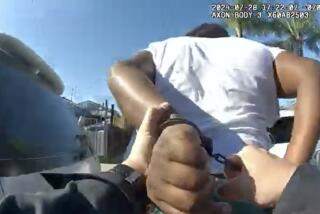Force Is at Issue in Police Trial
- Share via
Prosecutors and defense attorneys traded starkly differing versions Wednesday of the videotaped confrontation between former Inglewood police officer Jeremy Morse and a teenage boy during closing arguments in the police abuse trial.
Prosecutors said the violent encounter was the work of an angry, out-of-control cop. The defense said Morse did not use enough force on then-16-year-old Donovan Jackson.
“The plain and simple truth is it wasn’t enough.... He didn’t do it hard enough,” said defense attorney John Barnett, referring to the videotape of Morse hoisting and throwing Jackson atop a police car.
Barnett clapped his hands three times to show jurors how much time it took for Morse to lift and throw the teen, urging them not to “second-guess a decision made in a heartbeat.”
But Deputy Dist. Atty. Michael Pettersen, mimicking the angry gestures and arm thrusts that Morse used during the confrontation, told jurors they must decide whether “slamming” Jackson was a reasonable use of force.
“This was street justice. This was Mr. Morse’s intent to show his authority and to punish an individual who had the audacity to struggle against him in his world,” Pettersen said.
The closing arguments came on the seventh day of a trial that featured more than 20 witnesses in often-conflicting testimony over what happened about a year ago at an Inglewood gas station, when a traffic stop turned into a melee involving Jackson and several police officers.
Morse is charged with felony assault under color of authority. His former partner, Bijan Darvish, is charged with filing a false police report, also a felony. Both face three-year prison terms if convicted.
Barnett, during his closing defense argument, used the testimony of one of the prosecution’s use-of-force experts. Last week, Charles “Sid” Heal, a Los Angeles County Sheriff’s commander, said he would have disciplined but not recommended any criminal charges against Morse.
Deputy Dist. Atty. Max Huntsman, trying to defuse some of Heal’s testimony, said Heal was not qualified to decide whether the action was legal. In addition, Huntsman said, Heal “doesn’t want to see this cop get hurt.”
Huntsman told jurors that Heal and other witnesses testified that slamming Jackson on the car was not a proper use of force.
On the tape, Morse is shown punching Jackson after slamming him on the car trunk, but prosecutors appear to have given up trying to include the punch in the assault charge.
Several experts said it appeared that Jackson may have grabbed Morse’s testicles, which would justify the blow.
Barnett said even though Morse placed Jackson roughly on the car, Jackson was still able to allegedly grab Morse, proving the officer did not use enough force on the teenager.
“You don’t judge conduct by the tape, you put yourself in his shoes at that moment,” Barnett said.
Prosecutors for the first time admitted that Jackson did not follow police orders during his struggle with officers. Pettersen said Jackson, who suffers from a learning disorder, “shut down,” and was acting aggressively toward officers when the incident began.
But Jackson stopped struggling after he was wrestled to the ground and handcuffed, Pettersen said. “You can see that he doesn’t move” during those moments, said Pettersen, referring to the videotape. “He is a rag doll.”
Morse’s actions were, therefore, unnecessary and unjustified, prosecutors said.
Pettersen told jurors that Darvish attempted to cover up by lying on his police report, saying that Jackson was “assisted to his feet,” when the videotape shows he was thrown on the car.
Darvish “acted out of a misguided sense of duty and loyalty to his brotherhood, his brotherhood of police officers,” Pettersen said.
Ronald Brower, Darvish’s attorney, drew chuckles from some jurors by pointing out that prosecutors had called no witnesses to testify against Darvish. “I have never seen anything like this,” said Brower. “Not one iota of testimony against Officer Darvish. I ask myself: ‘Why am I here?’ ”
If Darvish and Morse are acquitted, no one expects the kind of violence that followed the Rodney King trial in 1992. Local authorities, however, are taking precautions. More than 1,000 volunteers will be urging calm in Inglewood.
A sore point with some community activists is the racial makeup of the jury. Although the trial of the two officers was held at the Airport Courthouse, only a few miles west of Inglewood, the jury doesn’t reflect the city’s population, which is about 50% African American.
The sole black juror is a 19-year-old Los Angeles man. During jury selection, he was initially excused from the panel by defense attorneys who also dismissed three other African Americans as potential jurors.
After prosecutors accused the defense of excluding jurors on the basis of race, Superior Court Judge William R. Hollingsworth ordered the 19-year-old man to return to the jury box. The three other jurors, the judge found, had not been excused because of their race.
Although the videotape has been shown repeatedly on local TV, at least seven jurors said they had not seen the images before the trial, according to an 11-page jury questionnaire.
The reactions of those who did see the tape were mixed. One Manhattan Beach man, for example, said it didn’t look good for the officer. But a 53-year-old Torrance woman said Jackson appeared to be resisting.
More to Read
Sign up for Essential California
The most important California stories and recommendations in your inbox every morning.
You may occasionally receive promotional content from the Los Angeles Times.










